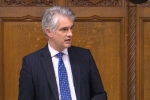
My recent article for Conservative Home:
It was barely a month ago, during the remaining stages of the Withdrawal Bill, that Brexiteer MPs lined up to oppose a pro-EEA amendment. But as I said in that debate: “I simply warn colleagues not to trash this option too much. It is not so much about burning bridges; we could be concreting over the only escape hatch credibly left to us if we get in to a crisis”.
Let us hope that the cement mixture has not yet set, because just this week an entire cohort of columnists, including some devout Brexiteers, have suggested that the EEA ‘Norway’ option might be the best Plan B. David Smith of the Sunday Times;plus Jeremy Warner, Philip Johnston and Tim Stanley of the Daily Telegraph, have all voiced support; whilst even Nick Timothy and ConservativeHome’s Paul Goodman have accepted the strength of the EEA option as a ‘port in a storm’.
Personally, I have always been clear that EEA is inferior compared to the kind of deep, bespoke bilateral deal that the Prime Minister is seeking; yet distinctly superior as a plan B when compared with WTO rules. Where the WTO option carries significant economic, logistical and political risk, the EEA route is potentially able to unify both sides of the debate – if used as a transitional ‘lifeboat’ out of the EU.
But all lifeboats have to dock somewhere. As we flounder in Brexit’s swirling currents looking for a raft to cling to, there is a risk of overlooking the great strategic potential of the Norway option: namely, strengthening an enlarged EFTA/EEA grouping – which would include the UK – to the benefit of all its members, building in effect Europe’s alternative non-political trading bloc with muscle. This is what I call the ‘New Common Market’.
At this point, it is a Brexit tradition to engage in a kind of tick-box theocratic top trumps of the various models of EU egress (Canada v Norway etc). With EEA you get the following pluses: relatively painless to join, as we are currently members; out of fisheries and CAP; out of justice and home affairs; strong economic ties but outside the political union; above all, in our current context, a safe passage through which to exit the EU that could probably command a majority in the Commons. Finally, we would be out of the Customs Union, able to negotiate our own trade deals.
That said, to avoid border friction you would almost certainly need a transition through the Customs Union until any new facilitation arrangements were in place. Since the EEA agreement covers the Single Market, this means we could potentially replace our current proposed ‘implementation phase’ transition based on effectively extending our EU membership, to an arrangement where direct ECJ oversight was confined purely to the Customs Union.
On the minus side: you are a rule-taker and have to accept free movement.
On free movement, if we steer our lifeboat out of the European Communities Act, using the Economic Area Agreement, that will be as an alternative to a transition with a guarantee of at least two more years of free movement, followed by a long-term deal where the precise nature of our new immigration rules is not yet clear. So really this question is more about how we avoid ‘Norway for now’ becoming ‘Norway forever’.
There is also the issue of non-EU immigration. I have previously argued on this site that, by ending free movement and moving to the Vote Leave suggestion of a single ‘non-discriminatory’ immigration system, unless we ban unskilled immigration (which is not remotely realistic), the effect would be to open up the unskilled channel to the whole world where it is currently confined to the EU. Latest figures show annual net migration at 320,000. 100,000 of this was from the ‘uncontrolled’ EU channel, 220,000 from the bit that we supposedly ‘control’ – non-EU. If unskilled migration is opened to all nations, it doesn’t matter how robust a visa system we put in place: it is a mathematical fact that non-EU migration will rise substantially as a direct result of Brexit.
The market is delivering the sharp fall in EU migration many leave voters wanted, and in my experience the biggest factor in this will not go away quickly – a surge in better quality employment back home for Poles, Romanians etc. We have to ask ourselves, if EU migration is falling so sharply without a new system, is not better to have an emergency brake in the (perhaps unlikely near-term eventuality) that this channel spikes again, than erect an entire default bureaucracy for all travel to and from our nearest neighbours?
But what of this ‘fabled’ emergency break? We know in black and white from the EEA agreement that such a measure exists, but has not been used in circumstances comparable to how we might wish. In fact, the main point here concerns our legal approach to EEA membership. My understanding is that there are two ways to be an EEA member: by virtue of being in the EU (i.e. with the EU’s agreement, as is the basis of our proposed EEA membership in the transition) or as part of EFTA. The latter can use the emergency break unilaterally, the former require European Commission approval.
Were we to re-join the European Free Trade Area which we co-created in 1960, our legal position in the EEA is arguably more pro-sovereign. This is because we could dock with the EFTA court, almost certainly with a British judge, instead of the only other option – EEA under the singular jurisdiction of the ECJ. I even understand from an excellent source that whilst our application to EFTA could take time and negotiation (e.g. on fishing) that, given Norway’s recent confirmation that they would not object in principle to our joining and with the other nations’ apparent support, we could ask to stay in the EEA ‘in lieu’ of becoming an EFTA member, till those details were resolved.
Would this be forever? We could pass a Sovereignty Act on joining EFTA to require the Government to report to Parliament periodically on how it is negotiating a long-term deal – effectively compelling us to keep negotiating. We would also surely be in our rights to expect a much lower divorce bill without a long-term deal this side of March, and the balance paid when we get one so that it’s in the EU’s interests to keep negotiating too.
But more important than all of the above is that the EEA/EFTA option is not a fantasy: its members are real nations, to whom we should show a little more respect if we expect them to partner with us in future. And in my view, once moored in safe harbour and looking at our choices for the long-term, we would surely have to consider asking our new partners if they wanted a better deal too.
The UK plus EFTA would have a greater GDP than Germany. As one, we would be the largest economy in Europe. At this point, we would definitively have left the EU, with our current febrile politics hopefully calmer. Surely a grouping of such heft could seek greater powers in Single Market matters – including on free movement – in what would then be technical, less heated discussions, with massive mutual gain to be had for us, the current EFTA members, and the EU? There would be a range of options for the long-term at that point, but seeking a New Common Market must surely be one of them, if we board the EEA lifeboat.
Published by Conservative Home.

